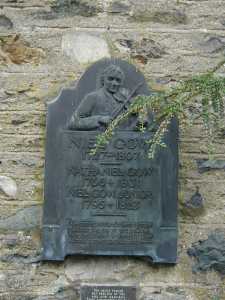

|
|||||||||
|
|
|
|
|
|
|
|
|
|
|
|
March 22nd 1807 |


|
Niel Gow, fiddler magnificent
The plaque at Niel Gow's house in Inver In 1727 Niel Gow was born here, certainly one of the finest fiddlers ever produced in Scotland. He demonstrated his talent early in life and at eighteen played in an entertainment given to Prince Charles. He even joined the Prince’s army, but soon left though he always remained a Jacobite. He formed his own orchestra and was very much in demand at both cottage and castle particularly at the castle of his patron and landlord the Duke of Atholl. This description of his playing is given by an English traveller, Dr Garnett in 1798. “We were favoured by a visit of Niel Gow a singular and well known character, and a celebrated performer on the violin. His only music is that of his native country, which he has acquired solely by ear, being entirely self-taught, but he plays the Scotch airs with a spirit and enthusiasm peculiar to himself. He is now in his 72nd year and has played publicly at Assemblies on his instrument for more than half a century. He favoured us with several pieces of Scotch music. He excels most in the Strathspeys but he executes the laments with a great deal of pathos.” In 1787 Burns in his Highland tour visited Niel Gow and records this slightly patronising description. “Breakfast with Dr Stewart- Niel Gow plays. A short stout-built figure, with greyish hair shed on his honest social brow, an interesting face marking strong sense, kind open-heartedness mixed with unmistrusting simplicity.” Niel was of course, not only a magnificent fiddler but he also composed a number of well-known tunes such as ‘Miss Drummond of Perth’, ‘The Atholl Volunteers’ and ‘Fairweel to Whisky’. He died in 1807 leaving a wife and two boys both of whom later became well-known fiddle players. The house where he lived is still occupied and contains a plaque commemorating the fact of his occupancy there. |

